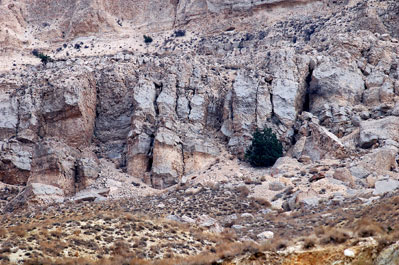| |
So Elijah did
what the Lord had told him.
He went to the Kerith ravine, east of the
Jordan, and stayed there.
(1 Kings 17:5) |
|
To the functionally
minded, Elijah's prolonged stay by the brook Cherith
looks like a waste of a promising life. Here was the
nation's foremost prophet, eeking out an existence in an
isolated nowhere. What chance had he now of addressing
king and court, or of leading a spiritual revival? But
God's ways truly are not ours. The time had not yet come
to send him back to lock tusks again with Ahab and
Jezebel.
By leading His servant away from the familiar mountains
of Gilead, and from the challenge of exercising a
prophetic ministry in a hostile setting, God was
offering Elijah not only an extended period of rest from
his labours, but a precious opportunity to deepen his
closeness to Himself. The stresses Elijah faced here
would be of a totally different kind.
Most of us depend far more than we realise for our
spiritual well-being on our relationships with each
other. Yet here Elijah was, a leader with nobody to
lead, and a preacher with nobody to preach to. That
alone would be enough to give most ministers an outsize
crisis of identity! |

Morguefile |
It is infinitely harder than it sounds to continue to
seek God when we have no obvious goal in sight. To be
able to abide for considerable periods of time in His
presence, without allowing fears to drag us down, or
passing excitements to turn our head, is a great
achievement.
At Cherith, God slowed Elijah's life down to walking
pace. The months God's chosen prophet spent, whiling
away long hot days by a remote wadi, stand in sharp
contrast not only to the superficial frenzy of the court
he had left behind, but also to the way most of us lead
our lives. It begs an important question for us
adrenalin addicts of the twentieth century: how can
Elijah's sojourn by the brook inspire us to change the
speed at which we lead our own lives?
Is there any way we can avoid living at so furious a
pace that we cause ourselves indigestion and insomnia?
Are we at risk of becoming a time-bomb on legs? Are not
at least some of our stress-points self-induced? We
would do well to examine these things, and to make room
for the things we really need in life time,
companionship, recreational activities, compassion and
so. They may be nearer to us than we had imagined.
| |
Bringing our souls into balance requires serious
choices.
A German Proverb warns, 'Wer hat Wahl hat
Qual.' (Whoever has choice has pain).
Our starting
point is clear enough:
we are concerned to follow our
Lord's example and do only what we see our Heavenly
Father doing.(1)
Working this principle out in practice, however, will
stretch us to the utmost. |
|
Elijah's options may have been more restricted than our
own, but he too would have experienced strong
temptations to disobey God by going somewhere else. It
is greatly to his credit that Elijah stayed where he
was. After all, would we be able to seek God peacefully
if we were faced by the daily possibility of being
attacked by wild animals?
Almost anything is bearable, provided we know how long
it is going to last. Yet Elijah had no way of knowing
how long God intended to keep him by the brook. In the
meantime he would have the decidedly dubious privilege
of being provided for by ravens an unlikely means of
support, but well chosen in that they would be far less
likely to betray Elijah's whereabouts than a fellow
human being.
It is an almost universal law that when earthly doors
are barred to us, the gates of heaven will swing open.
So far from allowing Elijah to perish in this remote
no-man's land, the Lord sent ravens to bring him food,
just as He had met the Israelites in the desert, and
supplied them with manna from heaven.
We can imagine that, as month succeeded uneventful
month, Elijah became more practised at seeking the Lord.
Although nothing happened outwardly, God was far from
inactive. Though he had no way of knowing it, Elijah's
most fruitful period of ministry still lay ahead of him. |
 |
Meanwhile, there was no
point sending his blood pressure soaring by worrying
whether the ravens would remember to come on the morrow
or whether tomorrow might be the day the Lord released
him from his enforced withdrawal. God was preparing him
to carry still greater burdens by teaching him to live
from one day to the next.
|
Soaked in the Word |
|
| |
Dietrich
Bonhoeffer passed a telling comment on the way
society works when he wrote,
We have no proper understanding of the need for
scriptural proof. We hear arguments "from life"
and "from experience" put forward as the basis
for the most crucial decisions, but the argument
of Scripture is missing. And this authority
would, perhaps, point in exactly the opposite
direction.'(2) |
|
The word of the Lord was
so powerful in Elijah's life because its truth lived in
his heart. In the days before the printed word, man used
his memory to better effect than he does today. We can
be sure Elijah would have taken the trouble to memorise
those portions of the Word of God which were then in
existence, and that he spent a great deal of his time by
the brook Cherith in prayerful meditation.
Precisely because so much of what I am sharing in this
book may appear to be 'experience-oriented,' it is
important to stress that we are not equipped to embark
on understanding the prophetic calling (or the
contemplative life either for that matter) until the
truths of the Bible saturate our mind, shape our
thinking and check our impulses. The Lord 'tunes' our
heart, and increases our wisdom as we study His word
verse by verse.
| Much though we will benefit by reading large chunks of
Scripture (and it is important for us to understand the
whole counsel of God) many of us will derive at least as
much profit from taking just a short passage, or even a
single sentence, and savouring it to the point where its
truth begins to live in our heart.
The Psalmist tells us
it is the entrance of God's Word which gives light and
imparts understanding.(3)
Like Mary we can ponder its
significance, and wait for the Lord to make the
interpretation and its application plain to us. Thus we
learn not just about God, but of God Himself directly,
through the help of His Holy Spirit. |

Morguefile |
Take a passage from the Bible, and read the text through
several times, preferably out loud, to let its truth
penetrate our heart. Try to imagine the scene, first
from the perspective of the speaker, then from that of
the hearer, the bystanders and so on. We will soon find
ourselves identifying with the joys and sorrows of
earlier pilgrims, and discovering fresh perspectives and
implications as we do so.
The word of God assumes a new depth once it is stored in
the heart. Many great musicians and actors feel that
they can only really bring a piece of music or drama to
life when they have committed it to memory. This is not
the way most of us operate but perhaps we ought to. A
Chinese believer, imprisoned for twenty three years, and
deprived of access to the Bible, testified on his
release how greatly the many passages of Scripture he
had committed to memory as a young man had sustained him
during those long years. How much Scripture would we be
able to recall if put to such a test? Most of us do not
have bad memories: we simply have undeveloped ones!
We can enjoy so much that Elijah was deprived of. We
have access to Christian literature that distils for us
the wisdom of the centuries, as well as every possible
aid to Bible study. A little imagination, combined with
a few good reference books, can lead us into all manner
of fruitful lines of study. The possibilities are
endless. Whatever form of reading plan we adopt,
however, should cause us to read God's word until we
receive His marching orders for the day. For the Bible
is not so much a book to be studied, and a set of
doctrines to be learnt by rote, as food for our mind and
manna for our soul.
|
A Cherith Week |
|
| |
Western
spirituality has long tended to focus on
positive action: 'What God has done for me and
what I must do for God.' The result has been
that we live our lives at breakneck speed,
constantly acting and reacting to stressful
situations. I have increasingly come to the
conclusion that most well-established Christians
are less in need of the additional teaching
their mind has taught them to expect, than a
deeper awareness of the Lord Himself. Times
apart can greatly strengthen this. |
|
| |
|
Many of us will
experience great blessing if we can manage to set aside
a week alone, with nothing to do except to seek the
Lord. Whether we spend it in a retreat centre, or in our
own house, the important thing is to set ourselves
entirely free from our day-to-day responsibilities. We
are not retreating from the world: we are advancing
towards our Father.
Such an immersion in the Lord's presence can have a
revolutionary effect on our relationship with God. In
the stillness and the silence we will learn to seek the
Lord, face ourselves, and, in the process, overcome many
strongholds of darkness. In retrospect, we will realise
that such weeks may have permanently altered many of our
perspectives and priorities. |

Morguefile |
Reflections
I believe that God was showing us a spiritual
pattern when He took Elijah away from civilisation.
Cherith was a trysting place as well as a hide-out: an
appointed rendezvous where lovers meet. As such, like
Elijah's later pilgrimage to Horeb, it challenges us to
consider the benefits of setting aside our own 'Cherith'
weeks.
| |
What steps are
you taking to allow yourself extended 'time out'
with God?
Practical measures will need to be taken even
for a single day away, let alone a whole week,
but the effort involved will repay itself many
times over. |
|
Selah |
|
| |
Lord, help me to
make the effort to spend more time in Your
presence.
Quiet the worries of my mind, and enable me to
receive Your Word.
Develop my memory, and fill it with the truths
of Your Word.
Protect me from all distractions and deceptions
as I seek to go deeper in Your presence.
Help me love, embrace and cherish silence, until
I find You in the still place of my heart.
In Jesus' name, Amen. |
|
|
|

